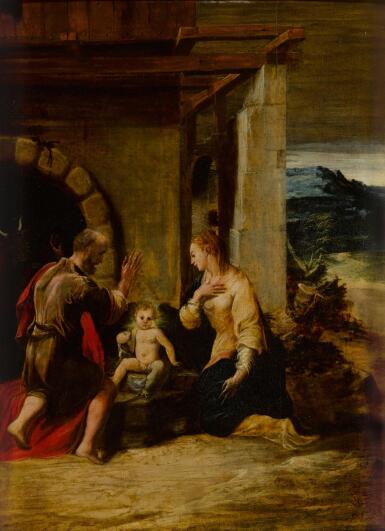
Girolamo Mazzola Bedoli
The Holy Family in a landscape
Auction Closed
October 18, 03:29 PM GMT
Estimate
60,000 - 80,000 USD
Lot Details
Description
Girolamo Mazzola Bedoli
Parma circa 1500 - 1569
The Holy Family in a landscape
oil on panel
panel: 19 5/8 by 13 7/8 in.; 49.8 by 35.2 cm.
framed: 28 1/8 by 23 1/4 in.; 71.4 by 59.1 cm.
There acquired by Richard L. Feigen.
Berceto, On the road, 5 August – 11 September 2011;
Bazzano, Museo Uomo Ambiente, Nel silenzio della Notte Santa, Girolamo Mazzola Bedoli, Matteo dei Pitocchi, Giovanni Odazzi, 16 December 2012 – 6 January 2013.
G. Cirillo, Dipinti e disegni del Cinquecento parmense nelle collezioni private, exhibiton catalogue, Parma 2008, pp. 53-54, no. 12;
E. Negro, "Girolamo Mazzola Bedoli, Sacra famiglia," in On the road 2011, exhibition catalogue, Berceto 2011;
M. Lucco, Nel silenzio della Notte Santa, Girolamo Mazzola Bedoli, Matteo dei Pitocchi, Giovanni Odazzi al Museo Uomo Ambiente, exhibition catalogue, Parma 2012, passim;
D. Ekserdjian, "Vent’anni dopo: postille alla monografia di Mario Di Giampaolo (1997)," in E. Fadda and G. Milanesi (eds.), Girolamo Mazzola Bedoli: eccellente pittore, e cortese e gentile oltre modo, Viadana 2019, pp. 53-61, especially pp. 59-60.
This small Holy Family in a Landscape is a relatively recent addition to the corpus of Girolamo Mazzola Bedoli, a Parmese artist whose career was closely intertwined with Parmigianino’s. An early work by Bedoli, it not only reveals his stylistic affinities with Parmigianino, but also preserves the characteristics of his more youthful hand, including a fluid brushwork, elongated and mannerist figures, and a skillful balancing of monochrome and warm color tones enlivened by light strokes of white.
This example by Bedoli connects closely to a number of drawings by Parmigianino: the overall composition can be linked to Parmigianino’s Nativity in the Devonshire Collection at Chatsworth,1 the Virgin to his Kneeling Woman in the Biblioteca Nacional in Madrid,2 and the Christ Child to his Sleeping Cupid in the British Museum in London,3 among others. The present lot can also be closely compared to a series of small scale works by Bedoli of the Holy Family that are all dated to before 1533, including a Nativity in the Fondazione Cini in Venice,4 a Holy Family with Saint John The Baptist and Angels in the Accademia di Belle Arti in Naples,5 and a Holy Family with Saints Francis, Anthony and John the Baptist in the Capodimonte Museum in Naples.6
Bedoli was born in the commune of Viadana, outside of Mantua, in about 1500-1505. His connections with Parmigianino, his direct contemporary, began at a young age, the two having fled Parma together during the war of 1521-1522. In 1529, Bedoli married the daughter of Parmigianino’s uncle, Pier’Ilario Mazzola, with whom he may have trained. Bedoli’s youthful style was so closely intertwined with Parmigianino’s that their hands are sometimes indistinguishable, and after the elder artist’s death in 1540, Bedoli became the most popular artist in Parma. His style moved slightly away from Parmigianino as his career progressed, eventually coming under the influence of artists such as Giulio Romano.
We are grateful to Professor David Ekserdjian for his assistance in the cataloguing of the present lot.
1. Inv. no. 804. See A. Gnann, Parmigianino, Petersberg 2007, vol. I, p. 425, cat. no. 479, reproduced vol. II, p. 380.
2. Inv. no. 8253. Gnann 2007, vol I, p. 414, cat. no. 409, reproduced vol. II, p. 409.
3. Inv. no. 1858-7-24-8. Gnann 2007, vol. I, p. 446, cat. no. 602, reproduced vol. II, p. 602.
4. Inv. no. 6352, oil on panel, 45 by 31.5 cm. M. di Giampaolo, Girolamo Bedoli 1500-1569, Florence 1997, pp. 114-115, cat. no. 1, reproduced fig. 1.
5. Inv. no. 599. Giampaolo 1997, p. 115, cat. no. 2, reproduced fig. 2.
6. Inv. no. 923. Giampaolo 1997, p. 117, cat. no. 5, reproduced fig. 5.
You May Also Like










